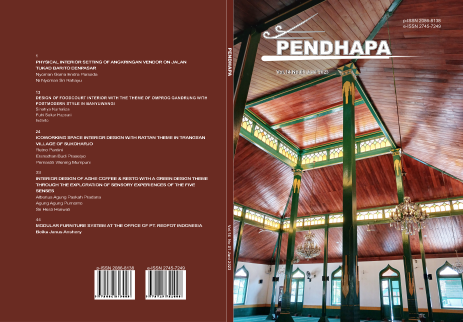Modular Furniture System at the Office of PT. Redpot Indonesia
Main Article Content
Abstract
There are many ways to raise office employee quality. Innovating desk chair facilities to meet the demands of working methods is one of the things that can be pursued. It has been established that the working style of the employees—the majority of whom are young people—requires a productive and exciting work environment to increase the quality of work. Various approaches have been investigated to achieve the design planning of office work facilities, from recommending the design of desk chair facilities following furniture ergonomics to establishing layouts in rooms that match the characteristics of the office atmosphere. Unfortunately, interior designers frequently overlook something equally important to consider, namely the requirement that the design of seating areas related to the desks and chairs used by office workers in daily activities be adjusted to the office branding characteristics and the psychological state of the workers in the space. This study aims to give relevant parties suggestions for appropriate working desks and seating areas to carry out activities using modular furniture. A descriptive qualitative research methodology is employed. Redpot Indonesia, an integrated promotional marketing firm that offers innovative promotional products and design services, is where the research is being conducted. This study aims to develop workspaces and workstations that accommodate employees' desires for social interaction and cooperative learning while facilitating productive work environments. Literature reviews, observational studies, and interviews are the data-collecting methods employed.
Downloads
Download data is not yet available.
Article Details
Issue
Section
Articles

This work is licensed under a Creative Commons Attribution-ShareAlike 4.0 International License.
Authors who publish with Pendhapa agree to the following terms:
- Authors retain copyright and grant the journal right of first publication with the work simultaneously licensed under a Creative Commons Attribution License (CC BY-SA 4.0) that allows others to share the work with an acknowledgment of the work's authorship and initial publication in this journal.
- Authors are able to enter into separate, additional contractual arrangements for the non-exclusive distribution of the journal's published version of the work (e.g., post it to an institutional repository or publish it in a book), with an acknowledgment of its initial publication in this journal.
- Authors are permitted and encouraged to post their work online (e.g., in institutional repositories or on their website) prior to and during the submission process, as it can lead to productive exchanges, as well as earlier and greater citation of published work.

This work is licensed under a Creative Commons Attribution-ShareAlike 4.0 International License.
